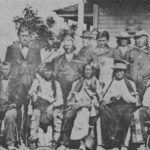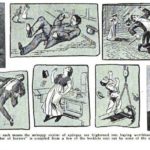
Chiefs of the Yankton Sioux With Their Indian Agents, courtesy S. J. Morrow Collection, the W. H. Over Museum, University of South Dakota
Indian inspectors had their hands full trying to ensure that laws and policies were properly carried out within all the reservations (see last post).
But, it was the Indian agent who actually made things tick at the local level. Almost all reservations had an agent, who wielded enormous power over the lives of the Native Americans who were living on them as wards of the U.S. government.
An agent could be competent or incompetent, moral or corrupt, or lazy or energetic, as his personality and background dictated. His judgment and decisions on every aspect of reservation life had a great impact on its inhabitants.
Agents had to put up a monetary bond before they could assume duties; the job must have been attractive enough for many individuals to do so. (In 1904, by law, the job paid between $1,000 and $1,800, but agents were actually paid according to the terms provided for in the various appropriations Acts.) Sub-agents were paid $1,000 annually, and their bond was the same amount–to put up an entire year’s salary as bond must have meant that the job was one worth having.
Agents made most of the key, day-to-day decisions involved in running a reservation. They were the men who decided that someone under their supervision needed to go to the Canton Asylum for Insane Indians. They may have acted on complaints about a person’s behavior, or information about problems the person had in caring for himself, and so on.
At times, unfortunately, the agent probably instigated the commitment himself after clashing with a difficult personality. All the agent had to do was write the Commissioner of Indian Affairs to ask for the commitment. After that, if the commissioner had no objections (and he seldom did) and there was room, asylum staff would come to the reservation to take what was now a new patient, away.







